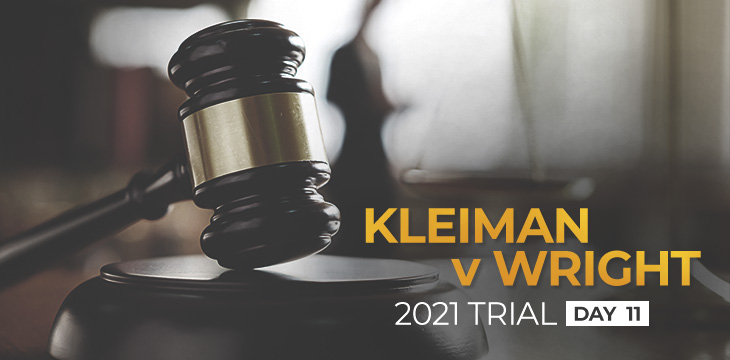|
Getting your Trinity Audio player ready...
|
Day 11 of the Kleiman v Wright trial in Florida began where Day 10 left off, with blockchain expert Kevin Madura educating the court on how Bitcoin works by explaining transactions on the blockchain, mining, game theory, statistics, mathematics, private keys, multi-sig, and more.
However, the defense struggled to make their argument by way of Madura’s testimony. This is because the plaintiff’s lawyers continually objected to the arguments that defense Lawyer Zalman Kass was making and the judge sustained nearly every objection; so much so, that it seemed to cause Kass to end his examination of Madura earlier than expected.
In their cross-examination, the plaintiffs attempted to highlight the fact that Madura has been retained by the defense at an hourly rate to do work related to this trial. More importantly, the plaintiffs tried to get Madura to undermine a statement he previously made about Dave Kleiman not being able to code. The plaintiffs made the argument that one does not need to be classically trained in computer science and that one does not need to take classes in computer programming to learn how to code. They tried to support this argument by bringing up statistics about how many software developers are “self-taught,” including Madura himself to a degree.
“Is it possible that Dave Kleiman could teach himself C++?” plaintiff’s lawyer Vel freedman asked.
“Yes,” Madura answered.
Freedman tried to imply that even though Dave was not classically trained to code, that he could have been self-taught, and gained the ability to know enough C++ to contribute to the Bitcoin code.
After a quick redirect from Kass, defense lawyer Michael Fernandez brought out the defense’s next witness—Nicholas Chambers.
Dave’s Bitcoin might be gone
Nicholas Chambers is a computer engineer and computer scientist that specializes in forensics. His testimony revolved around Dave Kleiman’s hard drives and thumb drives, reformatting drives, and the ability to identify and recover data.
Chambers reviewed five of Dave Kleiman’s computer hard drives and nine of his thumb drives, looking for any activity that would indicate that the contents of the drives had been impacted.
Chambers said he found that there were once encrypted files on the first three drives that were named “Do Not Delete,” he also found encrypted files on the last three drives.
According to the computer forensics expert, four out of the 14 drives were reformatted after Dave Kleiman died and that 13 of the 14 devices had been overwritten. That being said, Chambers emphasized that there is no way to determine what the content of the drives was before Ira over-wrote the drives.
Chambers’ testimony implied that if there was any Bitcoin-related material on the hard drives, that it was long gone, and that’s because Ira Kleiman chose to overwrite the drives.
The plaintiffs chose to cross-examine Chambers and tried to highlight the idea that the only person who has said that there was anything of value—like a large amount of BTC—on Dave’s hard drives was Dr. Wright.
Dr. Wright’s ex-wife
Next on the court schedule was a video deposition of Dr. Wright’s ex-wife, Lynn Wright. The defense asked Lynn questions about whether she ever heard Dr. Wright and Dave Kleiman talk about Bitcoin to one another, to which she replied “no,” suggesting that there was no partnership between Dr. Wright and Dave Kleiman when it came to Bitcoin-related matters.
When the plaintiffs cross-examined Lynn Wright, they asked Lynn several questions about W&K and the assets it owned. According to previous testimony and evidence introduced in court, Lynn Wright is the majority shareholder in W&K Info Defense Research, LLC; however, she came across as clueless when it came to many of the matters within W&K that you would expect the majority shareholder to be aware of.
When asked if she knew that Dr. Wright filed legal claims against W&K in recent years, Lynn Wright responded, “No.” She also seemed genuinely surprised to see email correspondence evidence in which her email address was involved.
The Lynn Wright deposition video ended after she said there was a point in time when Craig asked her to research how the Australian Taxation Office (ATO) could tax Bitcoin.
Humanizing Dr. Wright
A video deposition of Dr. Wright’s uncle Don Lynam was played next. Lynam served 30 years in the Royal Australian Air Force and has a lot of experience when it comes to IT, management, technology, and engineering. A few key points of Lynam’s testimony were that Dr. Wright is very smart, but he is not known for his “people skills.” Lynam talked a lot about Craig’s upbringing, career history, and knack for writing papers—the testimony humanized Dr. Wright, but it also served as strong evidence that Bitcoin was Dr. Wright’s idea and that Dr. Wright shared many of his early pre-2008 documents related to Bitcoin with Lynam.
Lynam talked about a token system that Dr. Wright created for an online casino called Lasseters and explained how this token system is a precursor to Bitcoin. Lynam also talked about how Craig told him to run a BTC node, and that Craig showed him a very early and rough version of the Bitcoin white paper in 2007 or mid-2008.
Ultimately, given what Dr. Wright shared with Lynam during the years when Bitcoin was coming to fruition, Lynam said that he has no reason not to believe that Dr. Wright was the sole author of the Bitcoin white paper.
The plaintiffs chose to cross-examine Lynam, but did not extract anything of substance out of him, the plaintiffs tried to argue that Lynam was prompted to talk nicely about Dr. Wright because Dr. Wright is his nephew, to which Lynam responded with:
“I agreed to do it [the deposition] because I believe in Craig and my knowledge of that time… I can answer all of the questions with absolute honesty.”
Dave Kleiman’s dying days
The defense also called Dr. Stewart MacIntyre to the stand. MacIntyre is a practicing doctor that specializes in infectious diseases, he has worked at numerous VA hospitals and has reviewed Dave Kleiman’s medical records—which he reports are somewhere between 10,000 and 11,000 pages long.
According to evidence introduced in court, Dave Kleiman spent two years, five months and two days in the hospital during his last hospitalization. Although his testimony has only just begun, MacIntyre has been making the point that Dave Kleiman was in the hospital as an inpatient majority of the time and that Dave was deemed critically ill, requiring extensive care due to the motor vehicle accident that left him paralyzed from the legs down. The doctor also noted that it appeared Dave Kleiman could never really be away from the hospital for more than a day because he needed the resources that the hospital was able to provide him with. This could imply that Dave was not able to help Dr. Wright in any sort of significant capacity since he could not go for extended periods of time without professional medical care.
Conclusion
Today was an eventful day in court where we saw many different faces on the stand as well as on video deposition. Witnesses for the defense have put the wind in the defense’s sails—particularly Don Lynam who has a very strong case that both humanized Dr. Wright and provided a very sincere timeline of the Bitcoin launch that is consistent with the actions Dr. Wright took to get Bitcoin off the ground.
The plaintiffs were able to successfully thwart the defense from extracting value from Kevin Madura, although they didn’t gain ground outside of that instance.
Thursday’s court session will continue with Dr. MacIntyre on the stand.
CoinGeek features Kurt Wuckert Jr. in recap coverage which will be livestreamed daily at 6:30 p.m. EST on our YouTube Channel.
Watch our Day 11 Special Report from the Kleiman v Wright trial here:
Check out all of the CoinGeek special reports on the Kleiman v Wright YouTube playlist.

 12-27-2025
12-27-2025 




